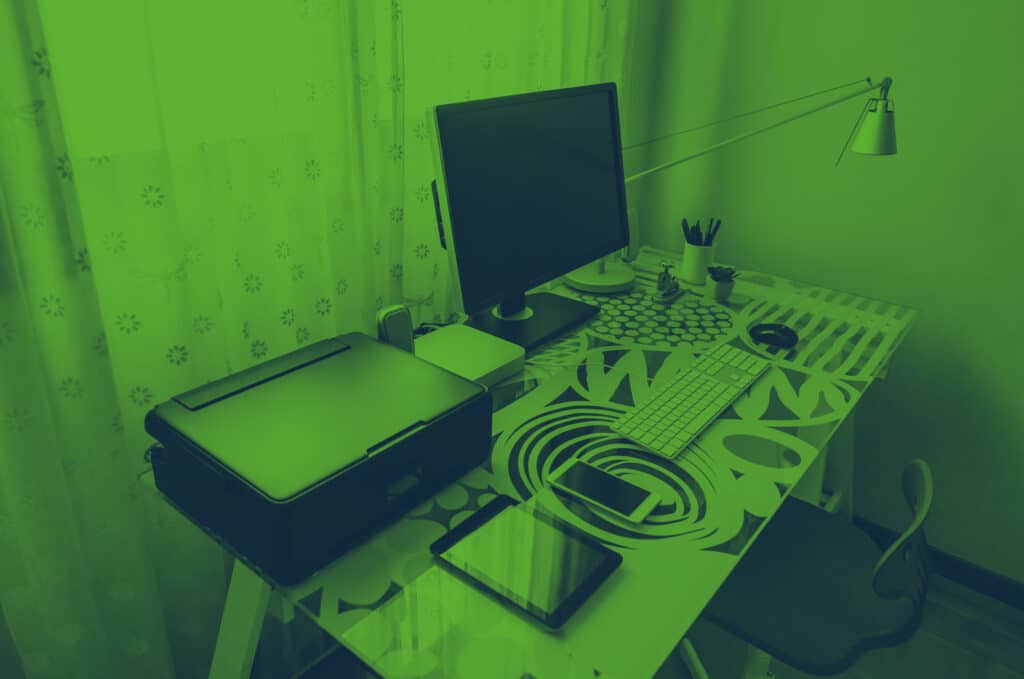So, you've just enrolled (or plan on enrolling) onto a distance learning
A-level course,
GCSE course or another vocational course from an online provider such as Oxbridge. There are many advantages to online learning, from flexibility to convenience, but if you want to make the most of your course, it may be necessary to create a dedicated study space where you can get your head down and focus.
In this guide, we’ll show you how to set up a great learning space at home – one that helps you stay focused, motivated and positive throughout your studies. This is also suitable for setting up a
homeschooling environment for your children.
Create the Right Desk Setup
Without question, your desk is the most essential piece of furniture you’ll buy for your study space, so it has to be right. While you’d be forgiven for thinking that any old table will do the job, a good, well-sized desk keeps you comfortable and motivated.
When buying a desk, there are a few things to look for. First, does it have adjustable legs? This can really help when it comes to getting the perfect study position, especially if you don’t want to splash out on a fancy chair too.
Next, consider how big the working surface is. Too small and you’ll feel cramped and disorganised; too big, and you may not have the right space in your home.
Maintain a Distraction-Free Environment
Studying from home is great for all sorts of reasons. However, if you have young children or noisy neighbours, there is one drawback to at-home study – and that’s distractions. When we’re trying to absorb knowledge or get ideas down on paper, distractions can be a huge blow to focus and concentration. That’s why it’s critically important to remove the risk of distractions from your study space.
If possible, set yourself up in a spare room or office that’s separate from other parts of your home. That way, you’ll have a closed (or even locked) door between you and possible distractions.
Next, consider soundproofing. There are all sorts of cheap soundproofing options that can significantly reduce noise, helping you switch off and zone in. And, if all else fails, invest in a decent pair of noise-cancelling headphones.

Make Sure There is Plenty of Light
Light is often a secondary consideration for those setting up a home workspace, but we think it should come top of your wish list. Natural light is proven to boost concentration and focus and can also help you stay happy and motivated throughout the day. That’s why, where possible, we’d always recommend setting your workspace up in an area with lots of daylight, so you can benefit from all that Vitamin D.
If natural light is scarce in your chosen study space, it’s worth investing in the right lamps and bulbs to keep concentration levels high. SAD (seasonal affective disorder) lights are developed to mimic daylight, helping to boost your mood and help you stay focused. Ideally, you want bulbs with brightness over 10,000 lumens to benefit from the improved concentration levels bright light can bring.
Personalise Your Study Space
While it may only be used for study and work, remember that a study area is YOUR space, so make sure it reflects your character and interests. Personalising your space will not only make it a more comfortable place to spend a lot of time, but it will boost your mood and focus, too.
Many distance-learning courses take months or even years to complete, so you’ll be spending a lot of time in your study. What’s more, with the rise of remote working, there’s a strong chance that you might end up using the space for work at some point in your career, so any time and money you invest in personalising it will be worth it in the long term.
When it comes to personalisation, combine your interests with practical elements that will aid study and concentration. Candles, cushions and throws add homely comfort, while a wall planner and clock can help you manage your time.
Invest in the Right Equipment
While you can take a distance-learning course on any laptop or computer, it’s worth considering the equipment you might need for an optimised study setup. Hunching over a laptop often isn’t the most comfortable or practical way to learn, so you may need to look at different options to ensure maximum comfort and focus.
If you usually work on a laptop, it may be a good idea to invest in a second monitor. That way, you can access online resources and materials more readily and keep them up for reference while completing other tasks.
With that setup, you’ll also need a mouse and keyboard. Consider ergonomics here; you’ll be spending a lot of time in front of the screen, so you need to be comfortable.

Keep Things Tidy and Organised
Whatever you’re studying, clutter is never good for concentration. If you want to stay focused and motivated throughout your course, it’s important to keep your study space clean, organised and free from clutter.
Try working in a messy room, and before long, you’ll find it difficult to concentrate. An untidy room often means an untidy mind, so if you’re keen to keep focus levels high, spend time each day organising your space and making sure it is fit for purpose.
Make Sure Your Study Space Feels Like an Extension of Your Home
While it’s important to eliminate distractions from your study space, that shouldn’t be at the expense of making the work area inaccessible and unhomely. If you plan to set up your work area in a spare room, for example, you need to make sure it still feels like a welcoming part of your home – and one you’ll be happy to spend time in for hours on end.
Remember, concentration often means taking regular breaks, whether it’s to interact with loved ones, play with a pet or complete household chores. Your study area should, therefore, allow for this, providing a flexible space for work, study and home life.
We hope this guide helps you create the perfect study space in your home. At Oxbridge, our distance learning courses combine the flexibility of at-home learning with outstanding course materials and specialist subjects, so you can achieve your career goals. For more information on our A-level, GCSE or other courses, chat with one of our experienced learning advisers on 0121 630 3000.


